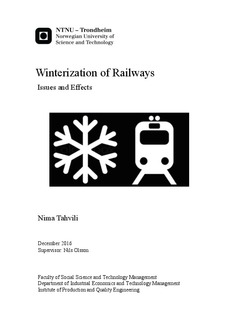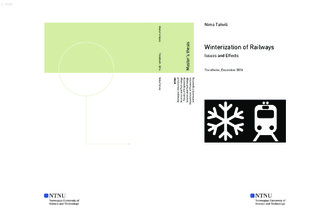| dc.description.abstract | Railways are an important mode of transportation all around the world. Inherent privileges of rail transportation, and increasing tendency of governments towards maximized utilization of railway systems, emphasize the importance of having high-quality train services.
Reliability of train services as an important quality factor, is evaluated through looking at various indicators, including the punctuality. Maintaining the services punctual, regardless of seasonal conditions has been a perennial concern for railways authorities. Though, it has become highlighted after many countries in Europe and Northern America, experienced widespread delays in train services, following the recent extreme weather patterns.
In order to address the issues with winter operation of trains , the current study (a) explores the expected consequences of various winter phenomena on railway operations, (b) reviews the technical and managerial problems that arose in the past winters, (c) gathers the existing countermeasures for addressing those issues, and (d) discusses the reasons why, despite many years of experience, railways are still being taken by surprise with occurrence of known winter phenomena. Furthermore, (e) development of a number of winterization measures in Norwegian railway infrastructure are studied, and (f) their impacts on winter performance of Norwegian railways in term of punctuality is reviewed. Finally, (f) the effects of low-temperature on occurrence and magnitude of delays for a selected number of trains are investigated.
In order to achieve the aforementioned goals, both qualitative and quantitative approaches have been followed through reviewing the literature, interviewing related individuals, and analyzing the punctuality and historical weather data.
By reviewing the performance of Norwegian railways in the recent years, an improvement trend for winter punctuality was observed. Comparing this with development of winterization measures in Norwegian railways infrastructure, proved that the level of winter-preparation affects the punctuality performance. Moreover, comparing the minimum daily temperature with probability of delayed services, revealed that the lower the temperature gets, the higher will be the probability of delays. Correspondingly, the higher number of regions with extremely low-temperature along the line, increases the probability and magnitude of delays. | |

